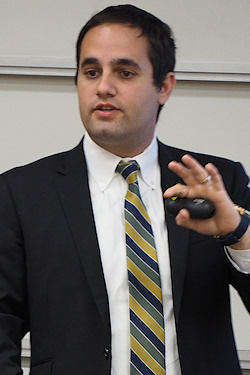Estate Planning Basics and the 5 Primary Ways to Transfer Assets at Death
 One of the two certainties in life is death (the other, of course, is taxes), and one critical way that lawyers can serve their clients is by assisting them to plan for seamless and straightforward asset transfer to their heirs. On October 10, 2018, Joseph Esry of Parman & Easterday (Overland Park, Kansas) gave students an informative overview of estate planning, sponsored by the Tax and Estate Planning Association and the Business and Transactional Law Center. Esry previously litigated in a wide variety of areas from appellate cases to real estate to probate and currently does estate, business and tax planning for his clients.
One of the two certainties in life is death (the other, of course, is taxes), and one critical way that lawyers can serve their clients is by assisting them to plan for seamless and straightforward asset transfer to their heirs. On October 10, 2018, Joseph Esry of Parman & Easterday (Overland Park, Kansas) gave students an informative overview of estate planning, sponsored by the Tax and Estate Planning Association and the Business and Transactional Law Center. Esry previously litigated in a wide variety of areas from appellate cases to real estate to probate and currently does estate, business and tax planning for his clients.
Esry explained the five most common ways that ownership of various types of assets can be transferred at death, ranging from survivorship in real property title and beneficiary designation on various contract rights to transfer on death statutes, probate, and trust. He walked through the advantages and disadvantages of each method and elaborated on the types of assets that each method applies to and the specific steps to involved in setting up each type of transfer.
Esry pointed out that many people reflexively think that estate planning is best accomplished through a trust, but that in some cases a trust is unnecessary. Realty and contract rights, for example, can be transferred directly at death through survivorship and designation. Esry explained the effect of transfer on death statutes that will effect an asset transfer outside of probate, but are subject to death taxes (although there is an $11 million threshold for such taxes). He outlined probate proceedings and types of probate and spent some time highlighting the problems that probate involves: its expense, duration, public nature, and associated loss of control by the heirs.
In explaining living trusts, Esry walked through three different types of trusts and pointed out situations when each would be used. He explained when trusts should be revocable and when they should be irrevocable and discussed the types of families and individuals that benefit from holding each.
Washburn Law thanks Joseph Esry for taking time from his busy schedule to speak with students about this important legal practice area and giving such a helpful summary of an area of the law that all students should know.
